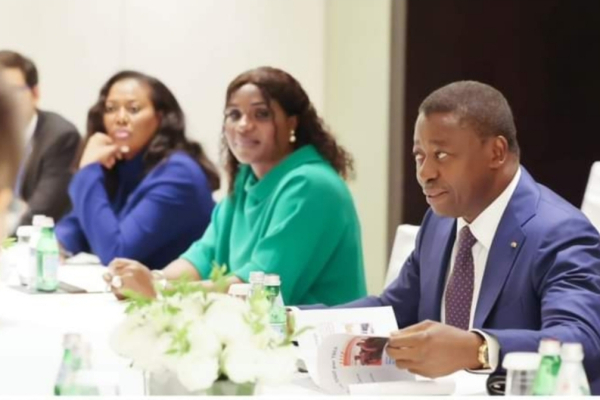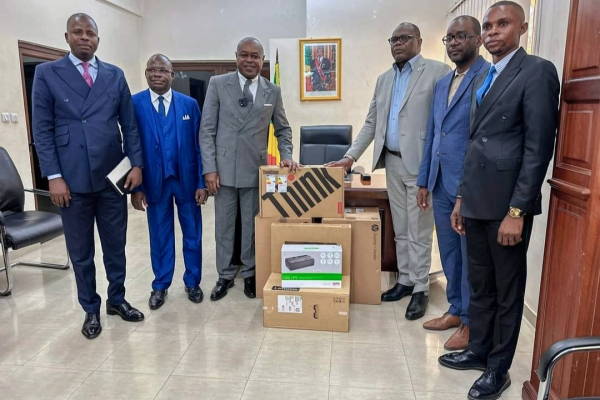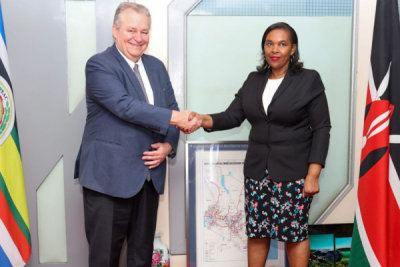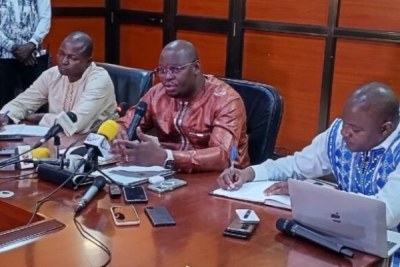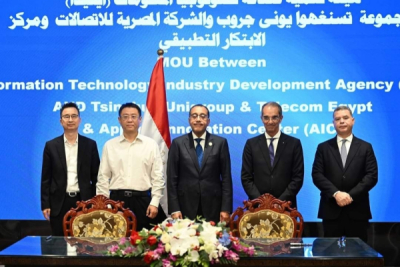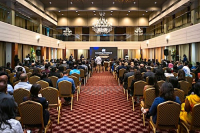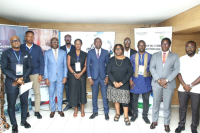
Public Management (599)
The Togolese government is focusing on high-speed internet, e-government services, and data security. To make this happen, it's teaming up with experienced international partners.
On September 4, in Beijing, Togo’s authorities signed a memorandum of understanding with Chinese tech giant Huawei. The goal of this partnership is to strengthen the country's digital infrastructure.
This deal was signed during the 9th edition of the Forum on China-Africa Cooperation. Togo’s leaders met with several Chinese companies to secure strategic contracts, with a focus on advancing their digital transformation.
This move aligns with the "Togo Digital 2025" strategy, launched in June 2022, which is aimed at promoting social inclusion and economic growth through digital advancements. Key initiatives include building a digital innovation ecosystem, providing widespread access to high-speed internet and technology, and digitizing key sectors of the economy.
In addition to Huawei, Togo has partnered with other tech companies, such as French firms Atos and Idemia, to develop a national electronic identification system. Earlier this year, the country also turned to Kazakhstan’s National Information Technologies to support digital projects and improve the digitalization of government services.
To support digital transformation, the authorities have launched the "Congo Digital 2025" strategy. This plan includes various programs and projects backed by multiple technical and financial partners.
Congo’s Minister of Posts and Telecommunications Léon Juste Ibombo, on Wednesday, unveiled several initiatives during a ceremony where computer equipment was donated to Marien Ngouabi University.
“A few months ago, we initiated the connectivity of the two major universities in our country, Marien Ngouabi University and Denis Sassou Nguesso University. The work is currently underway, and completion is expected by the end of this year,” Ibombo stated.
In addition to the university connectivity project, he highlighted the training of 1,200 young people in digital skills, funded by a $1 million World Bank grant, and the installation of high-speed free Wi-Fi on the Marien Ngouabi University campus.
These initiatives are part of the Digital Transformation Acceleration Project (PATN), aligned with the national "Congo Digital 2025" strategy. Supported by $100 million from the World Bank, the project aims to provide high-speed internet access to public administrations, universities, secondary schools, and rural areas.
Improving connectivity for academic institutions will help modernize the country’s infrastructure, facilitate access to online services and e-learning, and enhance young people’s digital skills, ultimately strengthening Congo’s competitiveness in the ICT sector.
Adoni Conrad Quenum
The Kenyan government is seeking international partners to bolster its digital transformation efforts. In June, a partnership with Malaysia was established towards this goal.
Kenya and Belgium are exploring potential collaborations in the digital sector. Margaret Ndung’u (photo, right), Kenya’s Minister of Information, Communications, and Digital Economy, met with Peter Maddens (photo, left), Belgium’s ambassador to Kenya, on Wednesday to discuss potential areas of partnership.
While specific details were not disclosed, the ministry indicated that the talks covered last-mile connectivity and other digital initiatives. The discussions come as Kenya actively seeks international support for its digital transformation.
In June, Kenya engaged in talks with Malaysia on cybersecurity and semiconductor production. In January, the Indian government approved a memorandum of understanding with Kenya focusing on the digital space.
International collaboration is expected to play a crucial role in advancing Kenya’s digital economy acceleration program. Since taking office, President William Ruto has made clear his ambition to leverage digital technology for socio-economic development by 2027. His plans include significant investments in infrastructure, such as deploying 100,000 kilometers of fiber optic cable, setting up 25,000 Wi-Fi access points, and digitizing 5,000 administrative services.
Isaac K. Kassouwi
In September 2023, Burkina Faso's government introduced an online platform for obtaining criminal records. The service was initially launched in Ouagadougou and is expected to expand to all regions of the country.
Justice and Human Rights Minister Edasso Rodrigue Bayala announced on Friday the nationwide expansion of the country's online criminal record system. The initiative aims to streamline the process of obtaining this vital administrative document for citizens.
The e-criminal record service was initially launched in September 2023 in the Ouaga I and II high courts. Following a successful pilot phase, the government decided to extend the service to all regions of Burkina Faso.
“Online requests have reached around 105,000 since the platform's launch. This demonstrates significant interest, as the system reduces costs, makes justice more accessible, and curbs corruption in the judicial sector,” Minister Bayala explains.
The expansion of the e-criminal record service aligns with the government's National Strategy for the Modernization of Public Administration (SNMAP) 2021-2025. One of the key objectives of the SNMAP is to enhance the accessibility of public services through information and communication technologies.
According to the United Nations' E-Government Development Index, Burkina Faso ranked 166th out of 193 countries in 2022, with a score of 0.3476.
Adoni Conrad Quenum
On September 2, the Egyptian government called on Indonesian companies to invest in the country’s burgeoning tech sector, particularly in data centers and digitalization. This move is part of Egypt’s broader strategy to accelerate its digital transformation.
On September 6, the Egyptian Information Technology Industry Development Agency (ITIDA) signed a memorandum of understanding with China's state-owned Tsinghua Unigroup. The collaboration aims to establish a $300 million fund to facilitate Chinese investments in Egypt’s tech sector.
Under the agreement, Tsinghua Unigroup and its subsidiaries will provide 60 to 70% of the fund’s capital. While the specific areas of investment were not disclosed, the agreement includes plans to build a data center, establish a research and development center for chip and system design, and develop an AI-based Arabic language model.
This initiative aligns with Egypt’s goal to attract foreign investment to boost its technology sector. In December 2023, Egypt signed an MoU with the United Arab Emirates to build data centers with a combined capacity of up to 1,000 megawatts. Additionally, Telecom Egypt secured a $600 million fiber optic investment from 4iG Group. During the 2nd Indonesia-Africa Forum on September 2, Egypt also invited Indonesian companies to invest in data centers and digitalization projects.
These investments are set to support Egypt's "Digital Egypt 2030" strategy, which aims to advance the country’s ICT sector and modernize its telecom infrastructure, positioning digital technology as a driver of socioeconomic development.
Isaac K. Kassouwi
Nigeria is projected to need nearly 28 million skilled workers with digital expertise by 2030, according to the World Bank. To address this growing demand across various sectors, the government has implemented multiple training initiatives.
The National Information Technology Development Agency (NITDA) has launched the first phase of its "Digital Literacy for All" (DL4ALL) program, targeting the Nigerian informal sector.
In a social media post on Saturday, the agency announced the partnership with the National Youth Service Corps (NYSC) to equip citizens from all 774 local government areas with basic digital skills.
The DL4ALL program aims to increase digital literacy rates to 70% by 2027. It aligns with NITDA's "Strategic Roadmap and Action Plan 2024-2027" (SRAP 2.0), which seeks to promote digital transformation and empower Nigerians through technology.
This initial phase will cover twelve states, including the Federal Capital Territory and the states of Kebbi, Jigawa, Yobe, Gombe, Kwara, Ekiti, Osun, Cross River, Bayelsa, Abia, and Ebonyi.
The launch comes at a time of growing demand for digital skills in Sub-Saharan Africa. According to a 2021 World Bank report, Nigeria's workforce will need approximately 28 million digitally skilled workers by 2030.
Adoni Conrad Quenum
South African lawmakers have completed digital economy courses to gain a better understanding of technology. Now, local officials are set to receive similar training.
South Africa's Minister of Communications and Digital Technologies Solly Malatsi on Tuesday launched the Broadband and Digital Skills Program, aimed at equipping municipal leaders and councilors with skills to leverage digital innovations, improve service delivery and enhance public engagement.
According to Malatsi, public representatives, particularly councilors, are often overwhelmed by numerous service requests and critical decisions they must make daily. Acquiring digital skills enables them to work more efficiently and respond more swiftly to public inquiries, making them more accessible to citizens.
The initiative, implemented in partnership with the British Embassy and the South African Local Government Association (SALGA), comes amid the rapid acceleration of digital transformation. It is part of the South African government's national strategy on digital and future skills. According to the strategy, acquiring digital skills is expected to create new jobs, significantly improve quality of life, education, and drive economic growth.
"In recognition of the fact that trends and advances in information and communications technology are ever evolving, we are committed to developing these competencies to realise our mission to digitally skill, upskill, and reskill the population," Malatsi said.
Adoni Conrad Quenum
The Mauritian government has rolled out several ambitious programs to boost the country's digital transformation. Early results are promising, with modern infrastructure and digital public services becoming a reality.
Mauritius launched its Mobil ID, a digital identity card, on Thursday, marking a significant milestone in its digital transition.
The event, presided over by Technology Minister Deepak Balgobin, also showcased the Mobile Wallet Application (MWA), the tool through which the digital ID can be obtained.
Balgobin said the Mobil ID is more than a technological innovation; it represents a decisive government commitment to modernizing the nation. "Mauritius stands out as the first African country to adopt a digital identity card that meets international ISO standards. This technological advancement positions our country at the forefront, reinforcing our role as a leader in this new digital era," he stated.
The Mobil ID is the result of a collaboration between Thales and Harel Mallac Technologies. It is a key component of the "Digital Mauritius 2030" strategy, which aims to make digitalization one of the main pillars of the Mauritian economy. This ambitious strategy includes significant investments in digital infrastructure, digital skills training, and transforming public administration into a fully digital model. Supporting this initiative, Mauritius Telecom (MT) expanded its 5G network nationwide as early as June.
According to DataReportal figures published at the beginning of 2024, Mauritius had approximately 982,500 Internet users out of a population of 1.3 million, reflecting the population's growing embrace of the digital age.
The Mobil ID stands out for its advanced features, allowing citizens to report a change of address or declare the loss of their physical identity card. It also facilitates the electronic signing of official documents. To ensure user security, the Mobil ID incorporates two verification systems and dual authentication, providing effective protection against identity theft.
Samira Njoya
E-commerce in Côte d'Ivoire has seen a surge in recent years, with a marked increase in online retail sites and sales volume.
Key players in Côte d'Ivoire's e-commerce sector gathered in Abidjan on Wednesday and Thursday to discuss the future of the industry. The market, valued at over XOF280 billion (€421.6 million) in 2023, is expected to see a compound annual growth rate of 11.3% through 2027, according to figures presented at the strategic workshop.
The workshop, initiated by the Ministry of Commerce and Industry in collaboration with the consulting firm Marabu, focused on promoting a national strategic vision for e-commerce development. The goal is to cultivate a competitive, inclusive, and sustainable digital ecosystem.
"We aim to position Côte d'Ivoire as a regional hub in this rapidly expanding sector. We are here to collaborate, exchange ideas, and develop initiatives that will foster a competitive, inclusive, and sustainable digital ecosystem," stated Sylla Kalilou, Director General of External Trade, who represented Minister of Commerce and Industry Souleymane Diarrassouba.
Like many African nations, consumers in Côte d'Ivoire are increasingly attracted to online shopping, driven by both local and international e-commerce platforms like Jumia, Afrimarket, and Africashop, which provide a diverse array of products and services. However, despite this rapid growth, the Ivorian e-commerce market remains largely underdeveloped, with many startups facing challenges in establishing themselves.
Through this initiative, the government aims to facilitate dialogue among stakeholders in the sector to enhance e-commerce in Côte d'Ivoire. The initiative also seeks to communicate ongoing reforms, which include drafting and validating a new e-commerce law, implementing a national e-commerce strategy, creating a strategic action plan through 2028, and developing regulations for a public-private consultation framework.
Samira Njoya
Launched in June 2022 by Osita Oparaugo, the Nigerian edtech GetBundi provides access to educational content in science, technology, engineering, and mathematics (STEM) and digital skills.
On Thursday, August 29, the Nigerian edtech startup GetBundi announced the signing of a memorandum of understanding (MoU) with the National Commission for Colleges of Education (NCCE). The initiative, titled "Empowering Tomorrow’s Teachers," aims to equip both students and teachers with essential digital skills.
“This initiative is not just about filling gaps in numbers but also about enhancing the quality and attractiveness of the teaching profession by equipping our future teachers with 21st-century digital skills. In today’s rapidly evolving educational landscape, our teachers must be well-versed in digital tools and technologies that enhance learning outcomes,” said Paulinus Chijioke Okwelle, Executive Secretary of the NCCE.
The program comes at a time when digital transformation is accelerating across the continent. Nigerian authorities are increasingly launching initiatives to train the population in digital skills. In August 2023, the government partnered with American tech giant Google, which plans to invest $1.5 million to train 20,000 youths in digital literacy. Later, the American Business Council (ABC) and Microsoft also committed to similar efforts.
These initiatives align with the digital agenda of President Bola Tinubu’s administration, unveiled in May 2023. Nigeria is a leading tech hub in Africa, with one of the most attractive startup ecosystems on the continent. Nigerian startups secured $469 million in 2023, representing 20.39% of the total funding raised by African startups, according to Partech Africa.
However, the country still faces significant challenges in the sector. According to the International Telecommunication Union, Nigeria ranks 26th in Africa with an ICT development index of 46.9 out of 100 in 2024, trailing far behind the top three—Libya (88.1), Morocco (86.8), and Seychelles (84.7).
Adoni Conrad Quenum
More...
Fake diplomas are becoming increasingly prevalent in Africa. To address this issue, governments are turning to digital solutions that offer effective and long-lasting solutions.
The Democratic Republic of Congo (DRC) plans to launch a digital system to combat fake diplomas and certificates, education officials said on Thursday. National Education Minister Raissa Malu and Higher Education Minister Mukuna Marie Therese announced the initiative after a joint meeting. The system, called "Optsolution," will verify state diplomas and certificates in real time.
"Graduates applying to university will only need a 14-digit code. The Higher Education Ministry's system will then access the National Education database for applicant information," said Rodrigue Iyembo, a National Education Ministry expert.
DRC's system aims to cut verification times from 4-5 months to instant checks. Future plans include extending the platform to private sector diplomas.
The platform is part of DRC's National Digital Plan, aiming to digitize key sectors by 2025, with education as a priority.
This move comes as African countries struggle with a rise in fake diplomas. Ethiopia, after finding nearly 1,000 counterfeit certificates among 18,000 reviewed in 2023, contracted Swiss firm SICPA to certify diplomas using blockchain and QR codes.
Samira Njoya
Despite facing challenges, African nations are investing more in Information and Communication Technologies (ICT) across different industries. In the field of education, Uganda is aiming to make significant advancements.
Ugandan authorities on Friday inaugurated the steering committee for an Augmented Virtual Reality (AVR) project at the Uganda Information Communication Technology (UICT) university. The project aims to introduce AVR into classrooms.
Fredrick E. Kitoogo, UICT's director, announced that “1,267 staff and students from UICT have been enrolled on the AVR platform, with 1,370 total logins recorded. 5000 educator licenses with 1267 already issued to UICT staff and students; and 750 enterprise licenses are yet to be distributed.”
The project is part of the Ugandan government's broader efforts to improve education quality through the use of new technologies. Authorities believe that virtual reality and augmented reality can create immersive and interactive learning environments, enhancing student engagement and motivation.
Uganda has also allowed smartphones, tablets, and computers in schools. “We are mindful of the fact that IT devices are expensive. So government has come up with projects like furnishing school computer labs. With time, government is coming up with measures to ensure that the cost of these devices is brought down so that they are as affordable as possible,” said Aminah Zawedde, Permanent Secretary of the Ministry of ICT.
Adoni Conrad Quenum
In 2023, Ethiopia launched a new artificial intelligence policy. To fully leverage the potential of this technology, the country is seeking strategic partnerships.
A delegation of Russian artificial intelligence (AI) experts, headed by Russia's Ambassador to Ethiopia, Evgeny Terekhin, visited the Ethiopian Artificial Intelligence Institute on Wednesday, August 21. They were welcomed by Taye Girma, the Institute's Deputy Director General.
The visit is part of the two countries' growing cooperation in the technology sector. As generative AI and large language models continue to advance, AI has become a key area of focus for their partnership.
Ethiopia adopted its national AI policy in July 2023. The policy outlines the country's strategy for leveraging AI to drive development, covering areas such as data management, human capital development, research and development, infrastructure, legal and ethical considerations, and international cooperation.
A partnership with Russia in AI could offer Ethiopia several benefits. It could facilitate technology and skills transfers, help develop AI applications tailored to local needs, and attract Russian investment in Ethiopia's tech sector, boosting innovation and job creation. For Russian companies, the cooperation could provide an opportunity to expand their influence in the AI domain in Africa.
Adoni Conrad Quenum
With the multiplication of digital transformation across Africa, cybersecurity has become a top priority for countries across the continent. To protect themselves and their institutions from potential threats, they are taking steps to strengthen their cyber defense.
Chinese tech company Huawei launched a cybersecurity training program for Zimbabwean government officials in Harare on Monday, aiming to strengthen their defenses against online threats.
The four-day course brings together 100 officials from various ministries. The curriculum covers global cybersecurity trends and data security governance.
"Huawei takes cybersecurity seriously, and we have made it a top priority in all of our operations and product development. Huawei invests heavily in research and development to ensure our technologies are secure and resilient against evolving cyber threats," said Yang Shengwan, managing director of Huawei Zimbabwe.
This initiative comes as digital transformation accelerates across Africa. Zimbabwe ranked 24th with a score of 47.7 out of 100 in the International Telecommunication Union's (ITU) Information and Communication Technology Development Index in 2024, up from 42.7 in 2023. In the ITU's Global Cybersecurity Index, Harare placed 17th in 2020 with a score of 36.49.
Adoni Conrad Quenum


